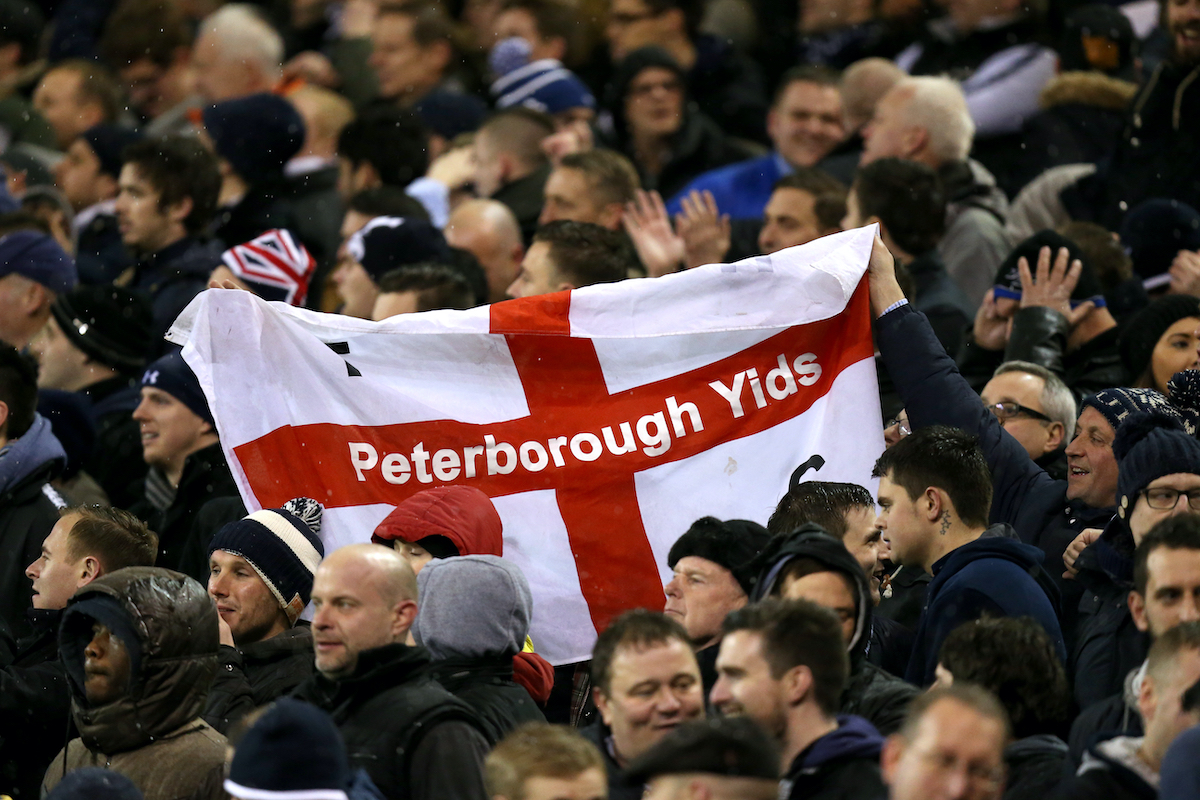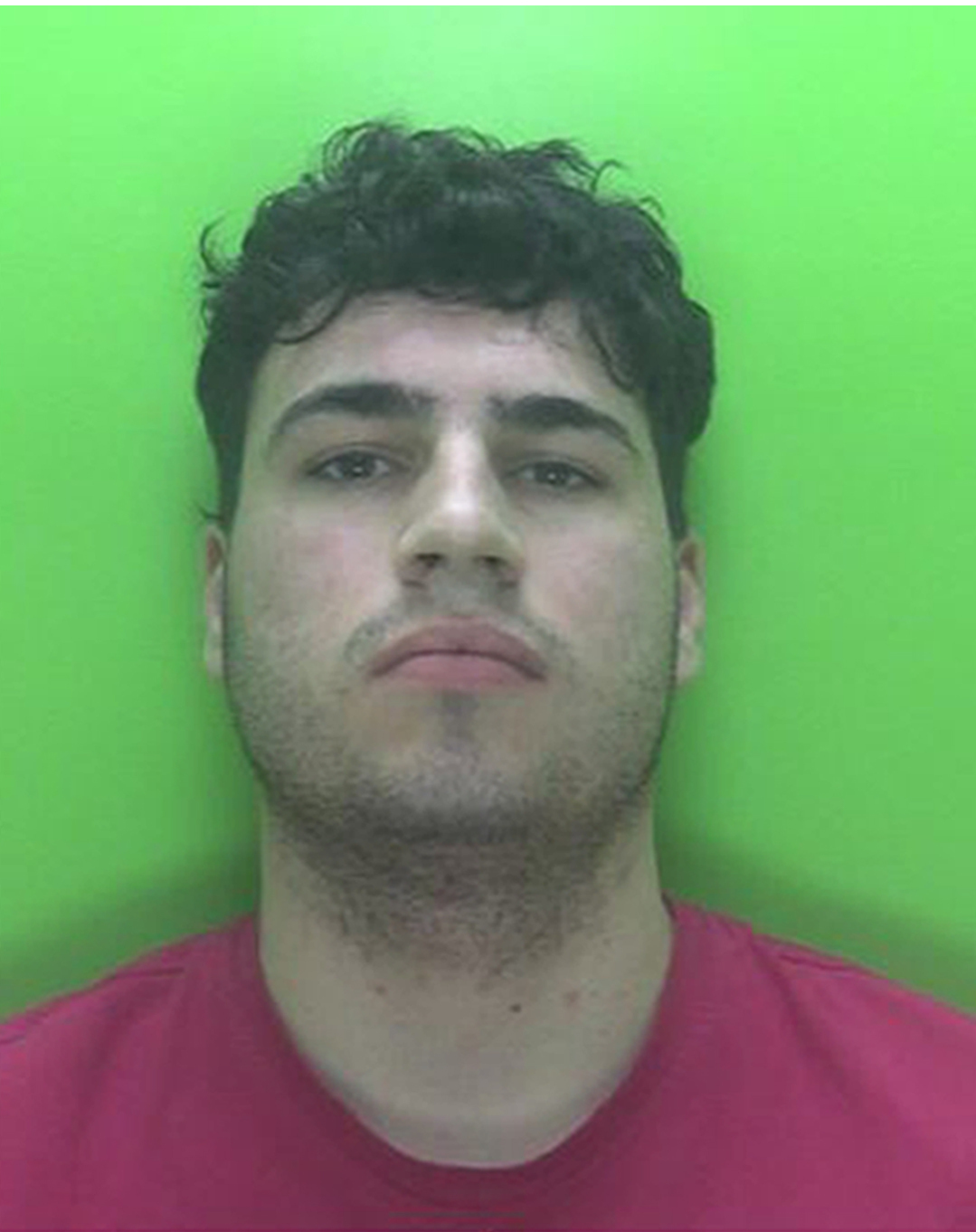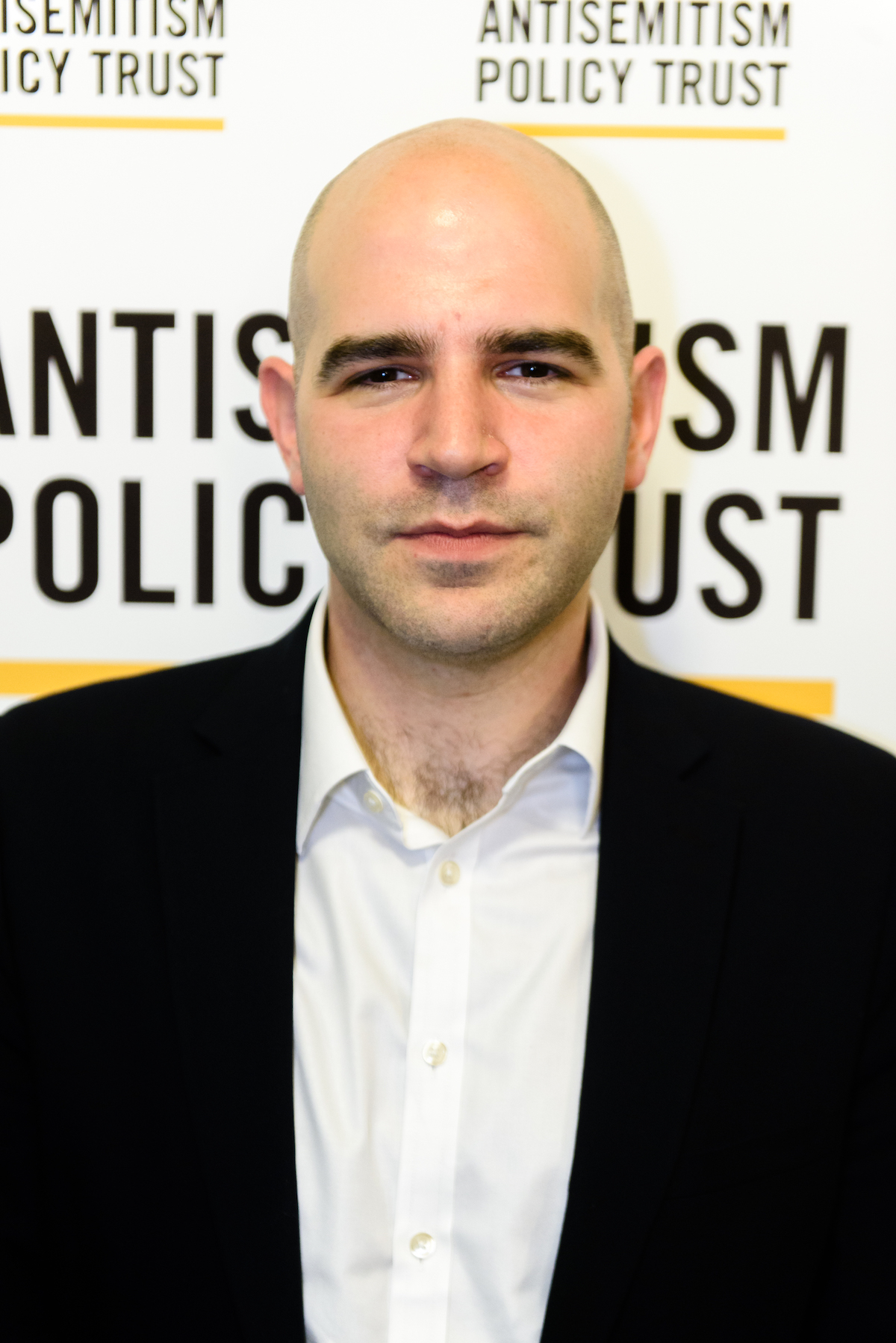SPECIAL REPORT: ‘Chanting the Y-word WILL be a thing of the past’
We reveal the extraordinary behind-the-scenes story of how Tottenham Hotspur finally decided to take a stand against its own fans over the use of an antisemitic slur.
Lord John Mann has said he expects Metropolitan Police officers to take increased action against away fans using antisemitic chants at matches against Spurs as a direct result of the north London club’s call for its own fans to “move on” from using the Y-word.
The Government’s independent adviser on antisemitism said the announcement by Tottenham Hotspur Football Club, which called on their own supporters to stop using the word “Yid” in songs and chants, had “made it easier for police to intervene with fans from other clubs”.
Lord Mann, former chair of the powerful All Party Parliamentary Group on Antisemitism, spoke out after playing a leading role in discussions with Spurs over the past decade on the need for culture change of over use of the word “Yid” by supporters.
Get The Jewish News Daily Edition by email and never miss our top stories Free Sign Up
Assessing the impact of Spurs new approach – which was made after a survey of 23,000 fans showed that “a significant section of our fanbase feel uncomfortable with the Y-word’s continued use at matches” – Mann told Jewish News: “It is much easier now for the police to intervene with other fans from other clubs.
“If someone is shouting antisemitic insults in a public arena, in the ground or in a pub, the police can do something.
“When non-Jewish football fans use these insults, I’d expect the police to act now. They no longer have the mitigation they had before.”
Lord Mann also called for stewards and police to prevent fans from taking national flags such as the Israeli and of Palestinian one into games.
“Flags being used as proxies at football is not helpful,” he said.

“The fewer Israeli or Palestinian flags we see in stadiums the better.”
The Metropolitan Police have been approached for comment over whether Spurs instruction to fans to avoid using the Y-word will impact on their own approach to policing games in and outside the Tottenham Hotspur Stadium.
To better understand the reason why Spurs announced in a statement on their official website at 9am last Thursday it was “time to move on from the Y-word”, Jewish News spoke to sources connected to the club, and to those such as Lord Mann, who have led calls for the north London giants to act decisively on the issue.
It became clear that the battle to change the thinking around the use of the word “Yid” had been a lengthy one, stretching back over decades, with senior figures at Spurs, including those close to chairman Daniel Levy, steadfastly resisting outside calls for change until fairly recently.
In 2010, the comedian David Baddiel and his brother Ivor, both Chelsea fans, had worked on a well-publicised short-film – featuring Spurs legend Ledley King, Match of the Day presenter Gary Lineker, and Stamford Bridge hero Frank Lampard – which to aimed to heighten awareness that the Y-word was a racist slur.
It was indeed an expertly produced film.
- OPINION: Ivor Baddiel – Moving on from the Y-word is a welcome step in a never-ending process
But one leading communal source recalled attending a screening of the film in the company of a representative from Spurs.
“Nobody in the room disputed the fact that the film accurately got across the message that the Y-word was a racist word,” recalled the source.

“But for the Spurs rep, they were very much still of the belief that their fans had adopted the word in a defiant, and yes, if it is possible, in an anti-racist way.
“I would describe their mood as being dismissive and combative to the Baddiel brother’s message, which was that it was time for all fans, be they Spurs or Chelsea to stop using the Y-word.”
To understand Spurs’ reluctance to tell their own fans to stop using the Y-word, one needs to look back on the history of the use of the Y-word.
In the 1930’s it had been Oswald Mosley’s fascists who had marched through areas of London’s East End in which the Yiddish speaking Jewish community lived chanting: “The Yids, the Yids, we gotta get rid of the Yids.”

There were also examples of Jewish authors such as Leo Rosten using the word to portray antisemitic speech, or in self-deprecating humour.
An episode of the popular TV sitcom Till Death Do Us Part in the 1960s would feature Warren Mitchell playing the character Alf Garnett, with West Ham scarf wrapped around his neck, screaming about “those Spurs Yids.”
The fact that Mitchell was in real life a Spurs fan himself, who had been attempting to poke fun at the rivalry between the two London clubs, was lost on most viewers.
- OPINION: Editor Richard Ferrer: Uncertain Spurs flatter to deceive on tackling the Y-word
But for Lord Mann, it was the 1981 FA Cup Final replay between Spurs and Manchester City that best explained why fans of the North London side adopted the Y-word so protectively for the next four decades.
This was the year Spurs had recorded one of the most popular football songs ever – Ossie’s Dream, written by Chas n Dave in tribute to the club’s Argentinian star Oswaldo Ardiles – with its famous “Spurs are on their way to Wembley” refrain.
But Lord Mann, a devoted Leeds United fan, had been invited to attend the replay of the match at Wembley, and still recalls the shock of hearing drunken City fans changing the words of the same song after drinking in central London, and instead chanting: “Spurs are on their way to Auschwitz.”
“It was really that day in 1981, the way the Ossie Ardiles song was turned around that led to the almost commonplace place antisemitic abuse of Spurs fans,” says Mann. “That cup final was particularly bad for that.”
For most Spurs fans, the biggest culprits of all when it came to singing antisemitic songs at matches though were not City but their London rivals Chelsea and West Ham.
It was to these two clubs, that Spurs fans would respond loudly back to with their own chants of “Yids!” and of “Yid army” – as a means of taking ownership again of a word spat at them with threats of violence and malice.
As well intentioned, and indeed as well-made as the Baddiel brothers’ anti-Y-word film was, the duo’s link to Chelsea would count against them in terms of convincing a lot of Spurs fans to stop using the word.
Anthony Clavane, author and Sunday Mirror journalist, and a devoted Spurs fan, wrote in 2012: “Personally, I feel uncomfortable walking to White Hart Lane and hearing the “Yid Army” chant.
“I feel it gives racist fans the licence to respond with offensive songs like ‘Spurs are on their way to Auschwitz’ and ‘He’s only a poor little Yiddo.’
“Yet I also understand why Jewish Spurs fans, like my friend Ivan Cohen, argue that supporters have ‘reappropriated the Yiddo slur as a badge of honour’
“As Ivan writes in his latest blog, ‘if you are truly serious about removing racism and antisemitism from football then you should start by dealing with the large sections of clubs such as Chelsea which constantly barrack Spurs on the basis of our alleged Jewish connections.
I feel it gives racist fans the licence to respond with offensive songs like ‘Spurs are on their way to Auschwitz’ and ‘He’s only a poor little Yiddo.
‘When they stop calling us ‘dirty Yids’ and making gas chamber sounds, when they stop singing ‘Spurs are on their way to Auschwitz’ I will happily then campaign for my fellow Spurs fans to stop applying the term Yids to ourselves.'”
Even the most hardened Spurs fans now admit that Chelsea have greatly improved the situation with regards to antisemitic chanting at their Stamford Bridge home ground in recent years.
Chairman Bruce Buck and the Chelsea FC Foundation have openly challenged and taken on the racist element amongst their support – and Holocaust Memorial events are staged yearly.

But it would be incorrect to say the antisemitism problem has been eradicated entirely.
So what did convince Spurs to finally change their mind on the issue?
High up on the list of contributing factors comes the alarming rise in reported incidents of antisemitism – including mounting anti-Jewish threats to Spurs chairman Daniel Levy and other figures at the club,, often from individuals or groups claiming to be loyal followers of Tottenham themselves.
It was pure coincidence that Spurs chose to make their Y-word announcement last Thursday, on the very same day the Community Security Trust released their annual Antisemitism Incidents report which confirmed record high figures.
A Spurs spokesperson confirmed to Jewish News the Y-word appeal had been released that day before it coincided with the government confirmation that as part of the relaxation on Covid regulations “fans were back in stadiums for good.”
But CST’s Dave Rich agreed that the report also contained confirmation that again there were a succession of incidents “where the Y-word was used as a term of racist abuse towards Jewish people in a non-footballing context.”
At Spurs, a thoroughly unsuccessful season on the pitch, in which the club dropped out of the Champions League spots, led to an upsurge in antisemitic abuse directed at chairman Levy and others in senior positions – with many of the slurs revolving around tropes of tightness with money in response to the failure to sign top quality players.
In August, Spurs were left appalled when a called to a TalkSport radio show was allowed to make an antisemitic remark about Levy, in a clip that was shared on the station’s You Tube site.
Tottenham immediately condemned the station for “failing to call out an antisemitic trope” on Levy, but later accepted an apology from the broadcaster.
Then there were a succession of high-proflle antisemitic incidents that circulated on social media. In November last year, a video of West Ham fans singing an antisemitic song to a Jewish passenger on a plan flying to Belgium appalled all who saw it.
That same month Chelsea fan Nathan Blagg was jailed after posting a picture of the train tracks to Nazi concentration camp Auschwitz on Twitter in a message aimed at Tottenham fans.

And then came the countless reports to police and to the CST of antisemitic incidents that involved the word “Yiddo” or “Yid.”
In a wider climate, in which others forms of racism were being openly challenged, Spurs attempt to retain some ownership over the Y-word seemed increasingly fragile.
“We are living in times of heightened awareness of cultural appropriation and sensitivities. It is therefore crucial to the values of our club and our fans that we are even more mindful of the controversial nature of this term”, the club said in their statement last week.
The influence of Spurs own supporter surveys which gauged fans views on the use of the Y-word should not be overlooked either.
In 2019, the club found that 33% of respondents in a survey used the “Y-word” in a footballing context, while almost half of the people who took part wanted to see the word used less, or not at all
The north London football club also held supporter focus groups about the use of the “Y-word”, which concluded in the summer of 2020.
Lord Mann had also conducted his own research into who used the Y-word amongst the Spurs fanbase, and why, how and when they used the term.
“The people who used the Y word to identify in public on social media, for example on Twitter, are absolutely overwhelmingly not Jewish,” Mann told Jewish News, of his findings
“They also tend not to live in London.. it is men living outside London, who have a fairly aggressive approach to lots of things on the internet.
They are also likely to be sexist, homophobic and hold quite extreme (right-wing) political views .
The people who used the Y word to identify in public on social media, for example on Twitter, are absolutely overwhelmingly not Jewish,” Mann told Jewish News, of his findings
“While they are not usually antisemitic, they are more likely to be antisemitic than they are to be Jewish.”
Jewish News understands that Spurs own research also gave them a similar picture of which fans were using the Y-word and in what circumstances.
It is confirmed how few Jewish Spurs were actually happy publicly identifying as “Yids” – in stark contrast to the higher numbers of non-Jewish fans.
The subsequent results of their most recent survey also confirmed 94 per cent recognised the word “Yid” could be a racist term.
Sources at Spurs confirmed they were also convinced into rethinking their stance over the Y-word by a series of high-profile media articles by long-time supporters, including Times columnist David Aaronovitch.
Jewish News has staunchly campaigned on stopping the Y-word being used at football for more than 10 years.

“High-profile, and loyal Jewish fans increasingly expressing dismay over the use of the Y-word by Tottenham fans was undoubtedly a factor in moving opinion on the issue,” a senior club source admitted.
“These weren’t people with any grudge against the club – they had supported us through good times and bad.”
It would be wrong to suggest last Thursday’s announcement was a complete surprise to fans. Many supporters groups were ready with statements to back the club over the move.
The Tottenham Hotspur Supporters Trust, one of the biggest supporter liaison groups, told Jewish News they “welcome the measured statement and clear position the club has taken in its latest communications.”
A THST spokesperson added: “It has long been our opinion that any move away from using the term needs to come from the fan base.
“We have also said that if and when the fan base decides the time has come to move away from using the term, we would support that process. That remains the case.
“The club’s latest statement indicates a growing number of fans are willing and able to conduct the discussion on that basis.
“It will now take time for the club’s request for a reappraisal and reassessment of the use of the term, and its accompanying awareness initiative, to have any effect. During that time, we restate our principle that any change should be achieved through consent and not through sanction. ”
Another factor in convincing Spurs they can make their call to end the Y-word chants is the success the Premier League have enjoyed with anti-racist Taking The Knee initiative.
Many were sceptical that the call for observance on the pitch would be accepted by fans in the stands. But despite the odd instances of booing – and criticism of the move from some in government – the move has been hailed as being remarkably successful in this country.
“There will be incidents, it will flair up now and then over the next few years,” says Lord Mann, in regards to continued Y-word chants. “But the Y-word will die a death.
“In 10 years time, someone chanting the Y-word… people will look at them just puzzled.
“There’s still one or two clubs that are booing taking the knee. But culture change in football is very possible.”

Danny Stone, Chief Executive of the Antisemitism Policy Trust, whose group has also been involved in discussions with Spurs added: “Tottenham is right to be phasing out the Y-word and putting an end to what has become an inspiration for antisemitic behaviours and discourse. This isn’t going to be quick or easy.
“Cultural change of this type takes time and consistent educational effort, and so I hope the club will inject energy and enthusiasm into the project.
” I hope too that the fan base will support the club that they love in doing this, certainly the true fans will. Spurs has our backing in its endeavours and we stand ready to offer practical support.”
A Met Police spokesperson said:”If there is an allegation of a hate crime we will investigate.”

Thank you for helping to make Jewish News the leading source of news and opinion for the UK Jewish community. Today we're asking for your invaluable help to continue putting our community first in everything we do.
For as little as £5 a month you can help sustain the vital work we do in celebrating and standing up for Jewish life in Britain.
Jewish News holds our community together and keeps us connected. Like a synagogue, it’s where people turn to feel part of something bigger. It also proudly shows the rest of Britain the vibrancy and rich culture of modern Jewish life.
You can make a quick and easy one-off or monthly contribution of £5, £10, £20 or any other sum you’re comfortable with.
100% of your donation will help us continue celebrating our community, in all its dynamic diversity...
Engaging
Being a community platform means so much more than producing a newspaper and website. One of our proudest roles is media partnering with our invaluable charities to amplify the outstanding work they do to help us all.
Celebrating
There’s no shortage of oys in the world but Jewish News takes every opportunity to celebrate the joys too, through projects like Night of Heroes, 40 Under 40 and other compelling countdowns that make the community kvell with pride.
Pioneering
In the first collaboration between media outlets from different faiths, Jewish News worked with British Muslim TV and Church Times to produce a list of young activists leading the way on interfaith understanding.
Campaigning
Royal Mail issued a stamp honouring Holocaust hero Sir Nicholas Winton after a Jewish News campaign attracted more than 100,000 backers. Jewish Newsalso produces special editions of the paper highlighting pressing issues including mental health and Holocaust remembrance.
Easy access
In an age when news is readily accessible, Jewish News provides high-quality content free online and offline, removing any financial barriers to connecting people.
Voice of our community to wider society
The Jewish News team regularly appears on TV, radio and on the pages of the national press to comment on stories about the Jewish community. Easy access to the paper on the streets of London also means Jewish News provides an invaluable window into the community for the country at large.
We hope you agree all this is worth preserving.
-
By Laurent Vaughan - Senior Associate (Bishop & Sewell Solicitors)
-
By Laurent Vaughan - Senior Associate (Bishop & Sewell Solicitors)
-
By Laurent Vaughan - Senior Associate (Bishop & Sewell Solicitors)
-
By Laurent Vaughan - Senior Associate (Bishop & Sewell Solicitors)






















